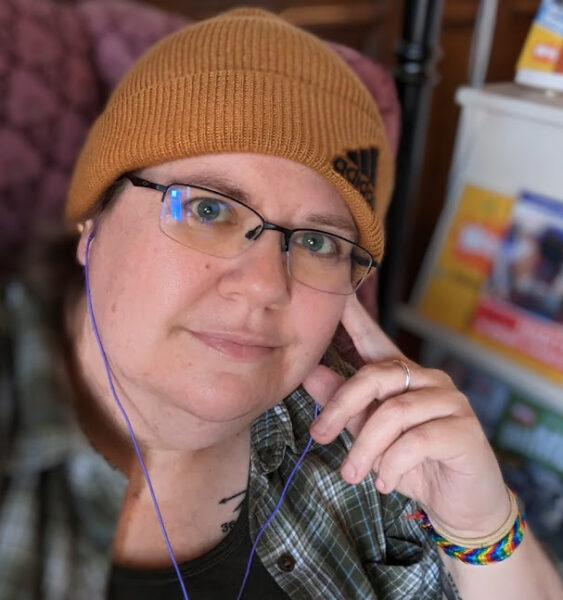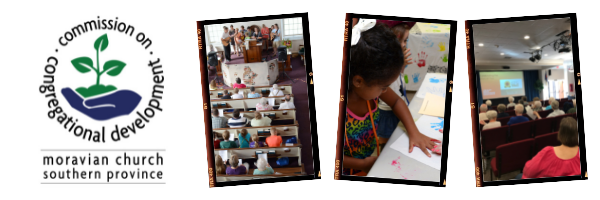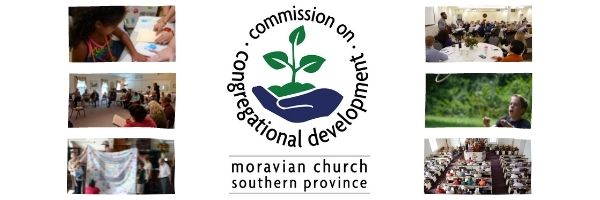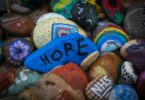written by Dana Myers
Building on Hope
In a recent Spotlight Blog article, Rev. Rebecca Craver challenged us to build a foundation for ministry by looking to hope for the positive. Her article named the fictional “Epiphany Moravian Church” which decided they were going to host a huge Vacation Bible School, only to become initially frustrated by the lack of engagement during their community outreach. Epiphany eventually decided to replace the large-scale, week-long opportunity with a much-needed weekly community dinner. At the dinners, parents and children joined together in community rest from cooking and cleaning, played board games, and chatted as fireflies danced in the nighttime summer sky.
Rev. Craver’s fictional Epiphany Moravian began their work with the all-important step of praying for their neighborhood, hoping to connect their local community to their ministry. Moving forward, Rev. Craver imagines an Epiphany Moravian Church that takes what they learned that first summer. They will continue to spend vested time in prayer over and for their neighborhood, discerning together what ministry looks like with their members and community partners.
Ministry is always contextual; leadership always starts with listening. Community leaders must always be able to discern what it is their communities value. Rev. Craver’s article inspired me to consider a prayer walk in my neighborhood with my own congregation. This walk would help us discover together the needs and hopes of our own ministry community in the area it affects most, our neighborhood.
Perhaps your church’s board members could spend a Saturday morning exploring the neighborhood or Women’s Fellowship groups could use their meeting times as an opportunity to get outside and take a community walk together. Explore the community at different times of day, on different days of the week, and consider making prayer walks a regular part of worship as we consider God’s Kin(g)dom at work among us.
What might God be up to in our neighborhood?
An Exercise in Prayer: Looking for God at Work
Let us begin the exercise in prayer. What is God asking us to pay attention to? Who does God want us to see? Where is God at work?
Take a 20-30 minute walk around the neighborhood near your church’s physical location. If your church is in a very rural area, you might consider driving 10 minutes in each direction from the church, taking the time to explore neighborhoods and subdivisions you might otherwise have driven past. Whether driving or walking, take intentional time to observe anything you think might suggest God’s presence at work. Are children playing at the local playground or park? Are families gathered outdoors if the weather is nice? Where do the school buses stop?
Pause at least 2-3 times on your walk to pray for folks you encounter. Ask God for wisdom in how to engage with families or individuals along your route. If you have the opportunity, engage with folks on your walk by asking their name and how you might pray for them. Don’t be creepy or disruptive! Ask God to give you fresh eyes for new opportunities to share the Gospel by engaging in everyday conversations with those around you. Especially look for those individuals who look different from you as you gather courage to strike up conversations. Ask God for eyes to see God’s children as God sees them and use the time to confess any perceived bias or prejudice that might occur as you encounter folks along your walk.
Take pictures, (as appropriate, again don’t be creepy or disruptive!) and share your photos with your church community. Explain what you think God might be up to in your context. What do the people value? What do they need? Who do they connect with in the neighborhood? How can your church community fill gaps in the neighborhood dynamic?
Connections Made to Last:
An imagined continuation of Rev. Craver’s Epiphany Moravian Church
The community of Epiphany Moravian decided to offer a seasonal Prayer Walk at varying times throughout the year. The first couple of prayer walks were quiet, contemplative times to offer prayers for a few families in the neighborhood. After a few walks, a member of Epiphany noticed the same young mother meet the school bus every afternoon with a toddler hoisted on her hip. Two other small children played in the yard while she met the bus where an older child joined their siblings.
Eventually, the Epiphany member gathered her courage and spoke to the young mother. The young woman was named “Angela.” Epiphany member “Carol” asked how she could pray for Angela and her family. The busy mother politely acknowledged the invitation to church but mumbled something about it being difficult to get everyone dressed and to service on time.
Carol continued to pray for Angela, waved politely when she saw her in her yard on a Sunday morning and on her next prayer walk, and commented on how much the children were growing. Angela unexpectedly burst into tears. She explained to Carol that her mother had recently been diagnosed with Parkinson’s Disease, and she didn’t know how she was going to get the kids to their appointments, pick up her oldest daughter from after-school activities, and take care of her mom, especially as her mom’s condition worsened.
Carol promised to pray for Angela and her family. At the next community gathering, she shared a photo of Angela’s front lawn and the children’s worn-out, somewhat-dangerous-looking playset with rusted metal legs and cracking plastic swings. Another community member mentioned that he was thinking of selling his children’s playset but wondered if Angela would accept it for her children instead; another noticed some rare plants in Angela’s overgrown garden, wondering if she would consider selling some of the bulbs once they stopped blooming.
Throughout the next few months, Carol intentionally met Angela at the bus stop at least a couple times per week. The men of Epiphany replaced the family’s aging playset, while some of the church’s avid gardeners freshened the flower beds, and the youth built a sandbox for Angela’s young children. One day Angela introduced her mother to Carol, who promised to continue to pray for her. On a chicken pie workday, one of the members of Epiphany asked if Carol would deliver a couple of chicken pies to Angela. At Easter they again delivered a meal, offering some leftover lovefeast buns to go with the main dish.
Without ever stepping foot into Epiphany’s sanctuary, Angela became a part of the community at Epiphany Moravian. As the prayer walks continued, Angela would walk a few blocks with Carol, pushing a double-stroller and updating Carol on her mom’s condition. When Angela’s mom passed away, Carol was the first phone call Angela made and her mom’s small memorial service was held in Epiphany’s Fellowship Hall. When Carol asked if Angela’s oldest might be available to sing “Morning Star” on Christmas Eve, Angela lit up with delight, tears shimmering on her cheeks when she asked if Carol was sure it would be okay, “since we don’t really go to church.”
As we enter into a new year filled with opportunities to explore our faith both inside and outside our church’s walls, may you be empowered to observe, to question, and to engage with your church’s neighborhood!
God is at work. May we be curious enough to discover where and how we can be involved in God’s Kin(g)dom building activities!
About the Author:
 Dana Myers has not always been Moravian, but she came “Home” as quickly as possible, becoming a member of the Home Church congregation in 2017. Dana was born into the Huntsville community of eastern Yadkin County. She attended Immanuel Baptist, Calvary Baptist and Union Grove Baptist Christian schools before receiving an Associate Degree from Forsyth Technical Community College in 2001. Returning to school as an adult student, she graduated from East Carolina University with a Bachelor of Science in Middle Grades Education. She taught sixth grade before attending Luther Seminary. Dana completed Luther’s MDivX program as a member of Cohort 2 (the “Quarantine Cohort”) and graduated with a Master of Divinity in June 2022. In May of 2022, Dana also graduated from Moravian Seminary with a Certificate in Moravian Studies. Alongside her Seminary education, Dana completed a unit of Clinical Pastoral Education through Park Nicollet HealthPartners. She is also an instructor for the Question-Persuade-Refer (QPR) Suicide Prevention method and a facilitator for Prepare-Enrich relationship and pre-marital education. Dana loves all things Moravian, but especially youth ministry, Candle Tea, the Children’s Festival and Laurel Ridge.
Dana Myers has not always been Moravian, but she came “Home” as quickly as possible, becoming a member of the Home Church congregation in 2017. Dana was born into the Huntsville community of eastern Yadkin County. She attended Immanuel Baptist, Calvary Baptist and Union Grove Baptist Christian schools before receiving an Associate Degree from Forsyth Technical Community College in 2001. Returning to school as an adult student, she graduated from East Carolina University with a Bachelor of Science in Middle Grades Education. She taught sixth grade before attending Luther Seminary. Dana completed Luther’s MDivX program as a member of Cohort 2 (the “Quarantine Cohort”) and graduated with a Master of Divinity in June 2022. In May of 2022, Dana also graduated from Moravian Seminary with a Certificate in Moravian Studies. Alongside her Seminary education, Dana completed a unit of Clinical Pastoral Education through Park Nicollet HealthPartners. She is also an instructor for the Question-Persuade-Refer (QPR) Suicide Prevention method and a facilitator for Prepare-Enrich relationship and pre-marital education. Dana loves all things Moravian, but especially youth ministry, Candle Tea, the Children’s Festival and Laurel Ridge.
Requests for republishing, click here
We’re always looking to share new stories and voices. Want to volunteer to write for us? Click here










